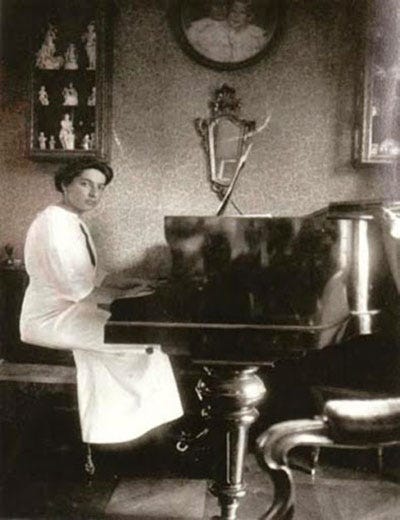An introduction to Dora Pejačević
Six pieces to start listening to Croatian composer Pejačević
It’s the centenary of Dora Pejačević’s death this year, so she’s been a spotlighted composer at the BBC Proms. Her orchestral songs, Cello Sonata in E Minor and Overture have all been given an outing, and you can catch up here on my discussion with Petroc Trelawny about the composer for the Proms premiere of her Symphony.
Her life was just as fascinating as her music. The daughter of a Croatian count and Hungarian countess, Pejačević was born into an aristocratic world that was rapidly disappearing. Her father was a politician and from a very young age Pejačević formed strong left-wing political opinions, expressing her disdain for her fellow aristocrats who did not work. She travelled widely, read voraciously, and spoke multiple languages. Well-connected in European cultural and political circles, she counted people like poet Rainer Maria Rilke among her friends.
One of the reasons we haven’t heard much about Pejačević until recently is because of her untimely death at the age of thirty-eight, just a month after giving birth to her only child. Given medical provision in the 1920s, it was always a risk for a woman to be pregnant in her late thirties. Perhaps with this in mind, Pejačević wrote a poignant letter to her spouse about how she wanted their child to be raised. It gives a real sense of her personality, and how hard she must have had to push for the musical career that she had:
May God grant that our child…brings you joy — that they become a truly open, great human being… if they possess great talent, provide them with everything that can serve their development; above all, give them freedom, wherever it may be required. For dependence on parents and relatives crushes many talents — I know this from my own experience — and therefore treat them equally, whether it be a girl or a boy.
Pejačević has a lush, late-Romantic sound. Her works are full of long melodies and powerful orchestrations — if you like Brahms, Saint-Saëns, Schubert and Dvořák, then you might enjoy Pejačević. So here are six of my favourite pieces to get you started on a Pejačević odyssey.
Piano Quintet in B Minor, Op. 40 (1915-18)
This is Pejačević at her finest. A bold, characterful work, this quintet is a complete delight. I’m particularly fond of the third movement scherzo.
6 Fantasiestücke, Op. 17 (1903)
Pejačević grew up playing the piano. She was first taught by her mother, who was a formidable pianist and singer. As a result she writes beautifully and idiomatically for the instrument. These fantasy pieces are both tender and melancholy.
Phantasie concertante in D Minor, Op. 48 (1919)
The Concertante is Pejačević’s second foray into writing for piano and orchestra; she had written a Piano Concerto in 1913 (making her the first Croatian composer to do so). I like the Concerto, but my sympathies lie with the Concertante. Her writing here is really assured and the solo part is great fun. This is Pejačević in more monumental mode.
Symphony in F-sharp Minor (1916-17)
During the First World War Pejačević volunteered as a nurse. The horrors that she witnessed caring for soldiers pushed her even further towards socialist politics, and prompted her to find an outlet in her music. She composed continuously throughout the war, perhaps as a means of processing what she experienced, perhaps as an escape, or perhaps as a form of protest. Composed at the height of the war, this Symphony is, in its way, all of the above.
Mädchengestalten, Op. 42 (1916)
These songs set texts by Rilke. Apparently the two considered writing an opera together, but it never materialised. It’s a real shame because judging from these songs, she had a real affinity for his ethereal, spiritualist poems.
String Quartet in C Major, Op. 58 (1922)
Pejačević’s final completed work, this quartet shows the directions she was moving in at the time of her death. It has a more advanced harmonic palette and experimental approach to form than her earlier works.
The Proms performance of Dora Pejačević’s Symphony is available via BBC Sounds until the end of September. If you want to find out more about Pejačević, Pamela Blevins has written an informative essay about her life here, and the Croatian Music Information Centre has information about her scores.




While I haven’t had an opportunity to listen to to the music yet, I can’t express how grateful I am to have you writing this on Substack. Fascinating history I would never otherwise know about.
I eco Dom's comments. I've just discovered her on BBC3 this morning and looked her up, then stumbled by chance to here as I have a substack account. Thank you so much for such a detailed and interesting piece of writing. I too will listen to the extracts. This is only the start of exploring her life and work.